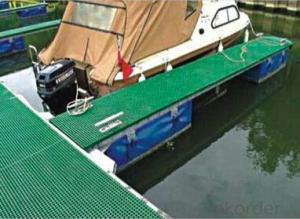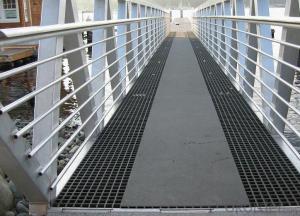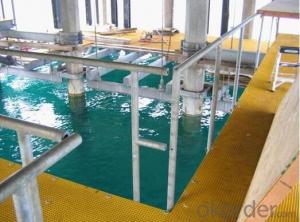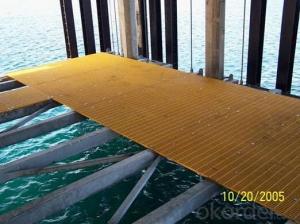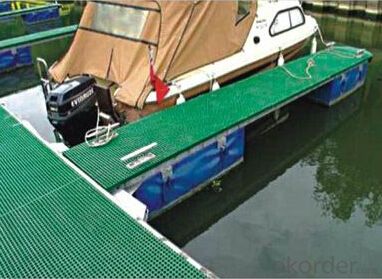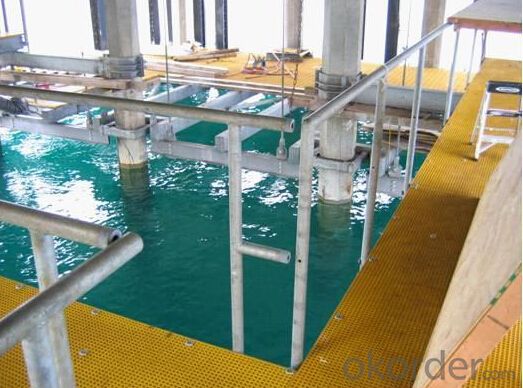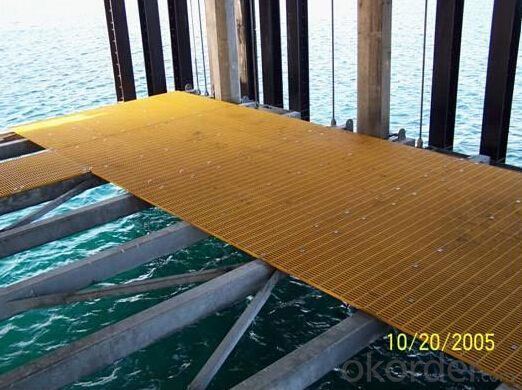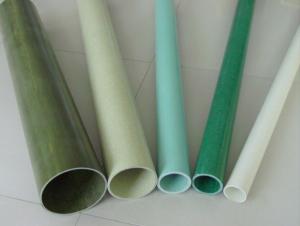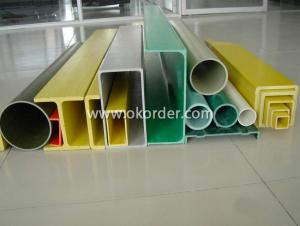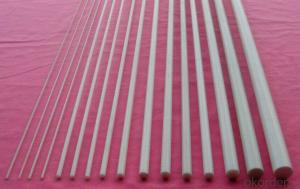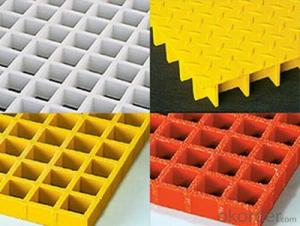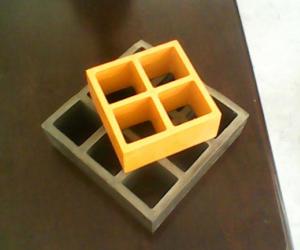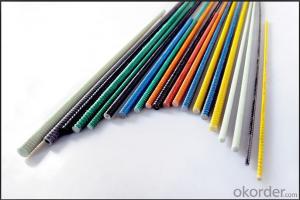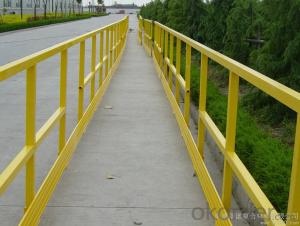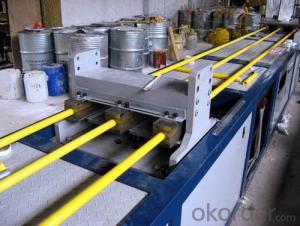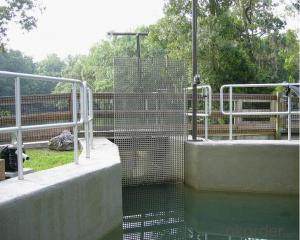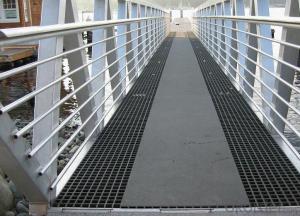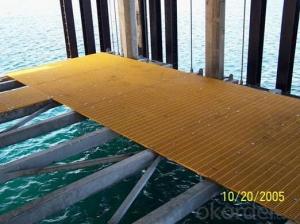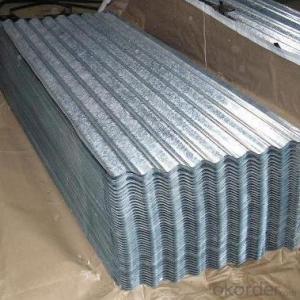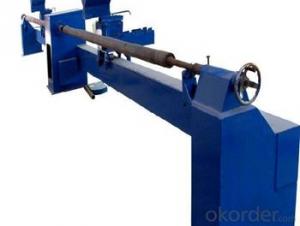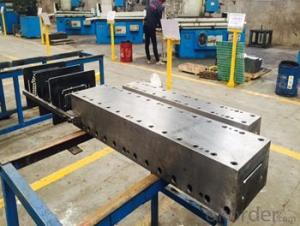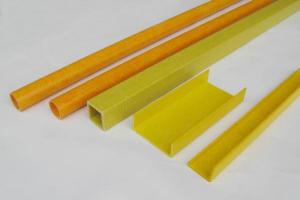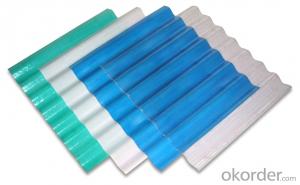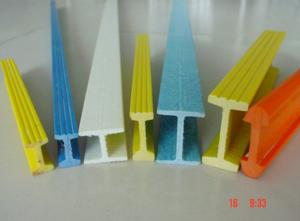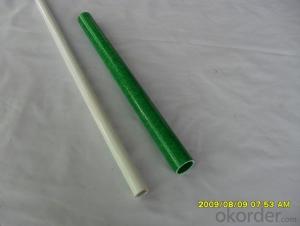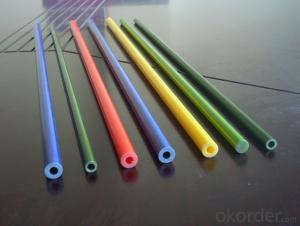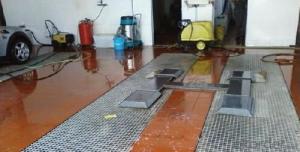FRP Pultrusion Profiles - Non-Skid FRP Gratings with Impact Resistance 2024
- Loading Port:
- Shanghai
- Payment Terms:
- TT OR LC
- Min Order Qty:
- 10 pc
- Supply Capability:
- 8000 pc/month
OKorder Service Pledge
OKorder Financial Service
You Might Also Like
Specification:
FRP molded grating made of vertical and horizontal continuous fiberglass fully soaked in unsaturated polyester resin giving perfect bi-directional mechanical properties. Combining unmatched corrosion resistance with strength, long life and safety, molded grating provide the ultimate in reliable performance, even in the most demanding corrosive conditions. Besides, it is easy to cut and install. CNBM offer the widest selection with panel sizes, colors and slip resistant surfaces, clients can avail FRP grating your specific requirements.
Product Features:
- Light but high loaded strength
- High anti-corrosion and anti-aging
- Easy installation and maintenance
- Low maintenance
- Non-conductive
- Lowest in life cycle cost
- Corrosion Resstance
- Anti-slippery
- Various sizes and color available
Colour Design:
To satisfy customer's design project, CNBM grating offers a wide selection of grating colors to choose from. The standard colors available for fiberglass grating as following:
- Blue
- Red
- Yellow
- Green
- Light Grey
- Dark Grey
Custom colors of fiberglass grating may be available upon request, you can contact us learn more.
Moded Grating Sizes List:
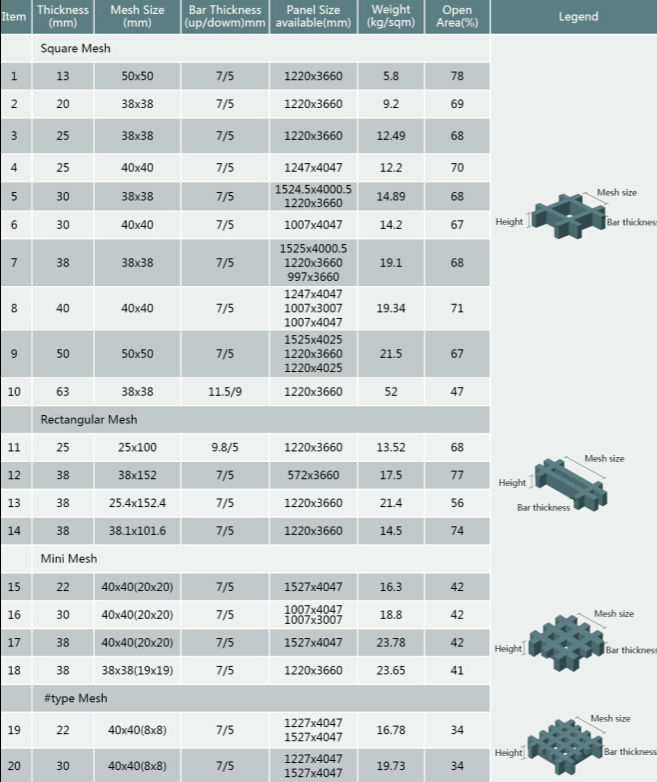
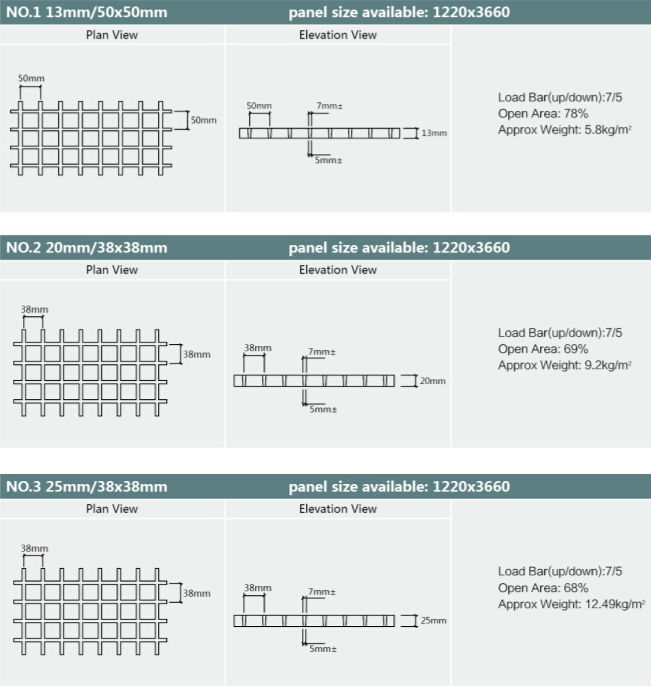
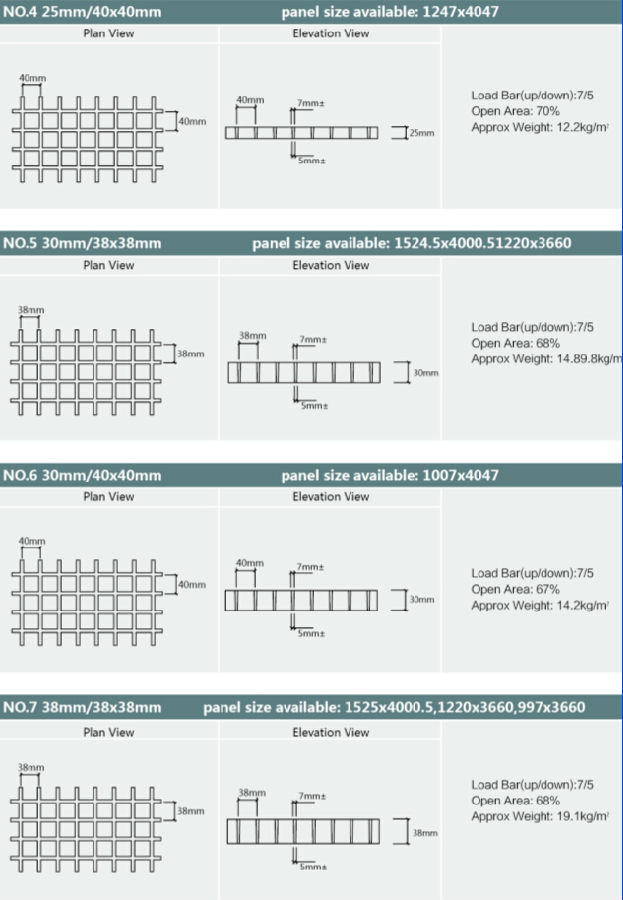
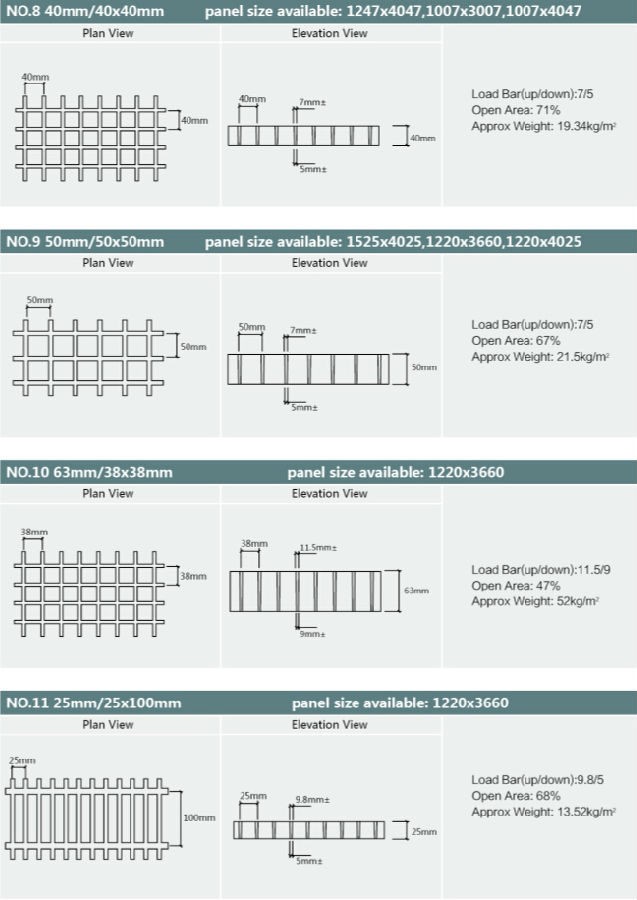
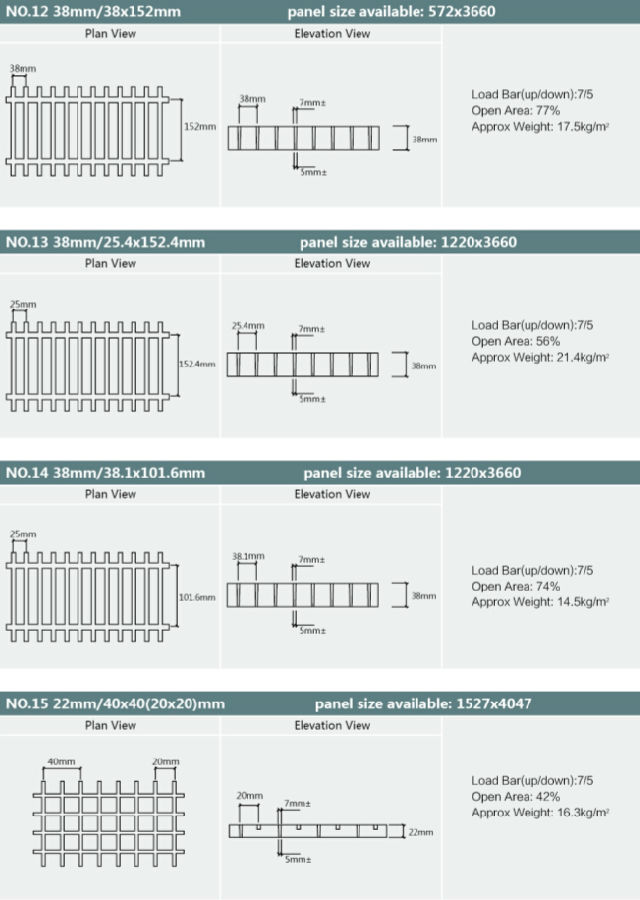
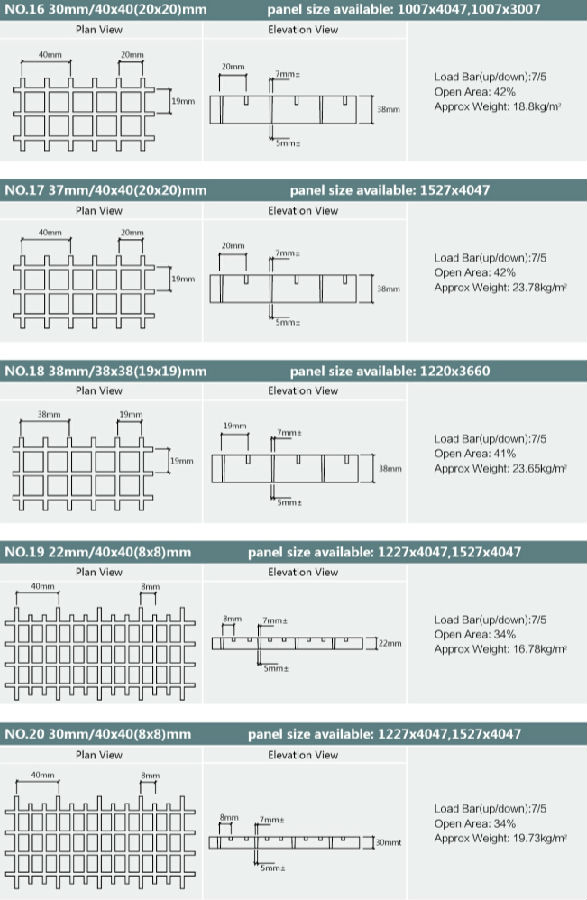
- Q: Can FRP pultrusion profiles be used in the construction of recreational vehicles (RVs)?
- Yes, FRP pultrusion profiles can be used in the construction of recreational vehicles (RVs). These profiles offer several advantages such as high strength-to-weight ratio, resistance to corrosion and rot, and excellent thermal insulation properties. Additionally, FRP pultrusion profiles can be easily molded into complex shapes, making them suitable for various applications within the construction of RVs, including structural components, flooring, walls, and roofs.
- Q: What is the compression strength of FRP pultrusion profiles?
- The compression strength of FRP pultrusion profiles can vary depending on the specific design and manufacturing process. However, on average, FRP pultrusion profiles typically exhibit compression strengths ranging from 20,000 to 40,000 pounds per square inch (psi).
- Q: The difference between polyurethane pultruded profiles and glass reinforced plastic profiles
- Compared with other materials, pultrusion with polyurethane can produce a variety of benefits. The utility model can improve the content of the glass fiber in the product and greatly improve the strength of the product. For example, pultruded window frames made of glass fiber and polyurethane resin, the strength of the resulting window frames is 8 times higher than that of the PVC window frames, and the conductivity is 40 times lower than that of aluminum. Therefore, the insulation performance is much better.
- Q: How do FRP pultrusion profiles compare to traditional materials, such as steel or aluminum?
- FRP pultrusion profiles offer several advantages compared to traditional materials like steel or aluminum. Firstly, FRP profiles are significantly lighter in weight, making them easier to handle and transport. This characteristic is especially beneficial in applications where weight reduction is crucial, such as in aerospace or automotive industries. Moreover, FRP pultrusion profiles are highly corrosion resistant, unlike steel which is prone to rusting and aluminum which can corrode in certain environments. This corrosion resistance makes FRP profiles ideal for applications in harsh or corrosive environments, such as chemical plants or coastal areas. Another advantage of FRP pultrusion profiles is their excellent strength-to-weight ratio. Despite being lightweight, FRP profiles exhibit high strength and stiffness, often surpassing steel and aluminum. This strength allows for the design of structurally efficient components, reducing material and installation costs. Furthermore, FRP profiles are electrically non-conductive, offering inherent insulation properties. This feature makes them suitable for applications where electrical conductivity is undesirable, such as electrical cabinets or offshore platforms. In terms of thermal conductivity, FRP pultrusion profiles have low thermal conductivity compared to metals. This characteristic improves insulation and reduces heat transfer, making them suitable for applications requiring temperature control or insulation, such as refrigeration or thermal insulation systems. Lastly, FRP pultrusion profiles are highly customizable. They can be easily molded into complex shapes and sizes, allowing for design flexibility and meeting specific project requirements. This versatility makes FRP profiles suitable for a wide range of applications, including construction, infrastructure, and industrial sectors. Overall, FRP pultrusion profiles offer numerous advantages over traditional materials like steel or aluminum, including lighter weight, corrosion resistance, high strength-to-weight ratio, electrical insulation, low thermal conductivity, and design flexibility. These benefits make FRP profiles a preferred choice in various industries, providing cost-effective and reliable solutions.
- Q: Are FRP pultrusion profiles resistant to caustic solutions?
- FRP pultrusion profiles are known for their resistance to caustic solutions. The combination of reinforcing fibers and the polymer matrix used in FRP pultrusion provides exceptional chemical resistance. Unlike traditional materials like steel or wood, which can be corroded or degraded by strong alkaline substances, FRP pultrusion profiles are highly resistant to chemical attack. This makes them suitable for industries that frequently encounter caustic solutions, such as chemical processing, wastewater treatment, and marine environments. However, it is important to refer to the manufacturer's specifications and guidelines to ensure compatibility between specific caustic solutions and the chosen FRP pultrusion profile.
- Q: Can FRP pultrusion profiles be used in the construction of recreational vehicles (RVs)?
- Indeed, FRP pultrusion profiles find utility in the construction of recreational vehicles (RVs). Renowned for their remarkable strength-to-weight ratio, resistance to corrosion, and durability, FRP pultrusion profiles prove to be an exemplary material for diverse applications, including RV construction. The fabrication of RVs necessitates materials that are both lightweight and robust to ensure fuel efficiency and structural integrity. FRP pultrusion profiles satisfy these requirements as they possess both lightness and high tensile strength, enabling the creation of sturdy and enduring RVs that are also lightweight and easily towed. Furthermore, FRP pultrusion profiles exhibit exceptional resistance to environmental elements such as moisture, UV radiation, and chemicals. Consequently, they prove to be suitable for outdoor applications, including RVs, where exposure to various weather conditions is inevitable. Additionally, FRP pultrusion profiles offer the advantage of effortless customization and adaptability to diverse shapes and sizes, thus meeting the design flexibility essential in RV construction. Beyond serving as structural components like frames, chassis, and supports, they can be employed for interior and exterior panels, floors, and roofs. All in all, the utilization of FRP pultrusion profiles in the construction of recreational vehicles bestows numerous benefits, including strength, durability, lightness, and resistance to environmental factors. These characteristics establish FRP pultrusion profiles as a dependable choice for RV manufacturers aspiring to fabricate high-quality, efficient, and long-lasting vehicles.
- Q: Can FRP pultrusion profiles be used in electrical or telecommunications applications?
- Yes, FRP pultrusion profiles can be used in electrical or telecommunications applications. FRP (Fiber Reinforced Polymer) pultrusion profiles have excellent electrical insulation properties and are resistant to corrosion, making them suitable for use in electrical and telecommunications infrastructure. Additionally, their light weight, high strength, and design flexibility make them a desirable choice for applications such as cable trays, support structures, and enclosures in these industries.
- Q: Can FRP pultrusion profiles be used in infrastructure projects?
- Yes, FRP pultrusion profiles can be used in infrastructure projects. These profiles are lightweight, durable, and corrosion-resistant, making them ideal for applications in bridges, walkways, railings, and other structural components. They offer high strength-to-weight ratios and can be customized to meet specific project requirements. Additionally, FRP pultrusion profiles are non-conductive, making them suitable for electrical infrastructure projects.
- Q: Can FRP pultrusion profiles be used in cooling towers?
- Cooling towers can indeed utilize FRP (Fiber Reinforced Polymer) pultrusion profiles. These profiles possess several advantages that make them suitable for such applications. To begin with, the corrosion resistance of FRP pultrusion profiles is exceptional, a crucial attribute in a cooling tower setting where exposure to water and chemicals is commonplace. Unlike conventional materials like steel, FRP pultrusion profiles do not rust or corrode, ensuring a longer service life and reduced maintenance expenses. Secondly, FRP pultrusion profiles exhibit a high strength-to-weight ratio, rendering them lightweight yet sufficiently robust to meet the structural demands of cooling towers. This facilitates easier installation and transportation, ultimately reducing the overall project costs. Thirdly, FRP pultrusion profiles boast excellent thermal insulation properties. As cooling towers involve the transfer of heat from water to the surrounding air, the thermal insulation provided by these profiles enhances the efficiency of the cooling process. Lastly, FRP pultrusion profiles are highly customizable and can be tailored to meet the specific requirements of cooling tower applications. They can be engineered to possess various shapes, sizes, and dimensions, ensuring a precise fit for the cooling tower design. Overall, FRP pultrusion profiles represent a dependable and cost-effective choice for cooling tower applications. Their corrosion resistance, high strength-to-weight ratio, thermal insulation capabilities, and customization options make them an excellent option.
- Q: Can FRP pultrusion profiles be used in the construction and building materials industry?
- Yes, FRP pultrusion profiles can be effectively used in the construction and building materials industry. These profiles offer several advantages such as high strength-to-weight ratio, corrosion resistance, and dimensional stability, making them suitable for a wide range of applications including structural elements, handrails, gratings, and reinforcements. Additionally, FRP pultrusion profiles can be easily customized to meet specific project requirements, making them a popular choice in the industry.
Send your message to us
FRP Pultrusion Profiles - Non-Skid FRP Gratings with Impact Resistance 2024
- Loading Port:
- Shanghai
- Payment Terms:
- TT OR LC
- Min Order Qty:
- 10 pc
- Supply Capability:
- 8000 pc/month
OKorder Service Pledge
OKorder Financial Service
Similar products
Hot products
Hot Searches
Related keywords
